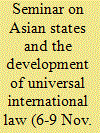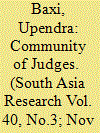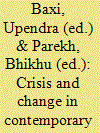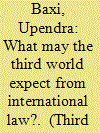| Srl | Item |
| 1 |
ID:
041736


|
|
|
|
|
| Publication |
New Delhi, Indian School of international Studies, 1967.
|
| Description |
6p.
|
| Series |
working paper no.; 7
|
|
|
|
|
|
|
|
|
|
|
|
Copies: C:1/I:0,R:0,Q:0
Circulation
| Accession# | Call# | Current Location | Status | Policy | Location |
| 001265 | 327.17/BAX 001265 | Main | On Shelf | General | |
|
|
|
|
| 2 |
ID:
174915


|
|
|
| 3 |
ID:
000530


|
|
|
|
|
| Edition |
1st ed.
|
| Publication |
New Delhi, Sage Publications, 1995.
|
| Description |
453p.hbk
|
| Standard Number |
8170364108
|
|
|
|
|
|
|
|
|
|
|
|
Copies: C:1/I:0,R:0,Q:0
Circulation
| Accession# | Call# | Current Location | Status | Policy | Location |
| 041861 | 954.04/BAX 041861 | Main | On Shelf | General | |
|
|
|
|
| 4 |
ID:
074633


|
|
|
|
|
| Publication |
2006.
|
| Summary/Abstract |
What may the Third World expect from international law? To answer this question, one must begin by interrogating the meaning of the terms 'Third World' and 'international law'. This article argues that the meaning of the term 'Third World' has historically had layers of complexity to it, and it crucially includes not only states but also peoples. On the other hand, grand narrative traditions of the rise and growth of international law remain typically concerned with its 'lawness', the changing nature of its subjects, and its sources. Arguing against such an understanding from a sociological perspective, the article argues that no longer can the re-make of contemporary international law be understood as the exclusive law of the West. It must recognise the authorial role played by the Third World in all its complexity.
|
|
|
|
|
|
|
|
|
|
|
|
|
|
|
|